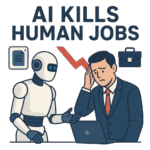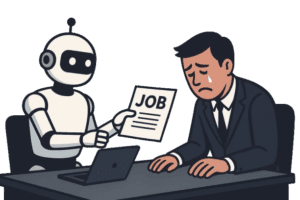Apply For Scholarship
Artificial Intelligence (AI) has become one of the most disruptive forces in modern history. From voice assistants to self-driving cars, AI is transforming the way we live and work. But alongside its benefits, a burning question arises: Will AI kill jobs in the future? The truth is, AI won’t just replace jobs—it will also reshape industries and create new opportunities

AI excels at handling repetitive, data-heavy, and predictable tasks. This means many routine jobs are at risk of being automated. Roles such as data entry operators, clerks, and customer support agents could gradually decline as AI systems take over.
However, while AI reduces demand for certain skills, it also boosts demand for new ones. Jobs in AI development, robotics, data science, digital marketing, and cybersecurity are on the rise, showing that employment is shifting—not disappearing.

ooking ahead, AI will become deeply integrated into every sector. In healthcare, it will assist doctors with early diagnoses. In education, it will create personalized learning experiences. In business, it will provide insights for smarter decision-making.
The future workforce must prepare for this transformation by reskilling and adapting to new technologies. Those who embrace AI as a tool rather than a threat will stay ahead.
AI’s impact on the job market is twofold:
Decline in traditional jobs – Manufacturing workers, retail cashiers, and transport drivers face high risks of automation as machines handle repetitive physical and clerical work.
Emergence of new roles – AI trainers, machine learning engineers, and data analysts are in demand as businesses rely on data-driven decisions. Similarly, digital marketing specialists are needed to manage AI-powered advertising, SEO, and customer engagement campaigns.
Instead of eliminating jobs altogether, AI is likely to redefine job structures, shifting the focus from repetitive tasks to roles requiring creativity, analytical thinking, and technological expertise. Data science and digital marketing are strong examples of careers that will expand as AI continues to grow.

The idea of AI completely taking over the workforce is often exaggerated. Yes, we’re already seeing automation in industries like retail (self-checkout machines), transport (driverless cars), and finance (AI-powered chatbots). But these changes won’t eliminate human involvement entirely. Instead, they’ll push humans to focus on skills AI can’t easily replicate—like creativity, empathy, and critical problem-solving.
Automation combined with AI will demand a workforce skilled in technology, adaptability, and innovation. Employees who can work alongside machines, interpret AI-driven insights, and apply human judgment will thrive.
Data Science: AI will generate enormous amounts of data, but humans with data science skills will be required to interpret insights, design predictive models, and translate findings into business strategies.
Digital Marketing: AI tools will automate ad targeting and SEO, but marketers with creativity and analytical skills will still be needed to design strategies, craft content, and manage campaigns that resonate with human audiences.
Meanwhile, individuals unwilling to upgrade their skills risk being left behind. In the long run, AI will not just remove jobs—it will transform careers and give rise to industries we can’t even imagine today.
So, will AI kill jobs in the future? Yes, it will replace certain roles, but it will also create countless new opportunities. The key lies in how we adapt. By embracing lifelong learning, improving digital skills, and exploring fields like data science and digital marketing, professionals can turn AI’s rise into an opportunity for growth rather than a threat to survival
Not entirely. While AI will automate repetitive and predictable tasks, it cannot replace human creativity, empathy, and problem-solving. Instead of eliminating jobs, AI will transform them, creating demand for new skills in areas like data science, AI development, and digital marketing.
Jobs involving routine tasks such as data entry, clerical work, customer support, cashier roles, and some manufacturing processes are most vulnerable. However, individuals who upskill in technology-driven fields will remain in demand
Yes. NDMIT provides industry-focused programs like Data Science with Machine Learning and AI-driven Digital Marketing. These courses are designed to help students and professionals gain future-ready skills that align with the evolving job market
The best way to stay ahead is by upgrading digital and analytical skills. Careers in data science, digital marketing, and cybersecurity are growing rapidly. Continuous learning and adaptability are key to thriving in the AI era.
Absolutely! NDMIT’s structured programs are beginner-friendly and include hands-on training, real-world projects, and mentorship. Even students without a coding background can transition into rewarding careers in Data Science and Digital Marketing.
Asia’s Leading Digital Marketing & Data Science Institute
A comprehensive methodology with the best curriculum, designed according to current corporate demands and needs.
Copyright © NDMIT Edusoft Private Limited
For security purposes, please solve this simple puzzle to verify you are human before sending an OTP.